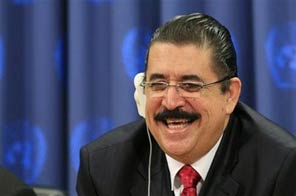Honduras shutters border
TEGUCIGALPA: The military-supported government of Honduras imposed a curfew on the border with Nicaragua ahead of a planned crossing Friday by ousted President Manuel Zelaya, who is seeking to end his month-long exile.
Defying government threats to arrest him and multiple warnings that the move would likely prompt bloodshed, Zelaya left the Nicaraguan capital of Managua late Thursday and drove to Esteli -- closer to the border region -- to prepare for a crossing attempt.
Accompanied by a flock of reporters, Zelaya boarded a 50-vehicle caravan along with iconic Nicaraguan former guerrilla Eden Pastora, his foreign minister Patricia Rhodes, and several Honduran community leaders.
Zelaya proclaimed that he would return home late Friday or late Saturday.
"We go with the white flag of peace to proclaim reconciliation for the Honduran people," Zelaya told reporters in Managua before leaving for the border.
The deposed president, who was kicked out of Honduras at gunpoint on June 28 in a move supported by the courts and Congress, expressed hope that the Honduran soldiers awaiting him would "lower their guns" when they see their elected leader and join his ranks to "raise the banner of democracy."
The high-stakes gamble unfolded as international rights groups slammed the government of interim Honduran leader Roberto Micheletti for a host of human rights violations, including extrajudicial executions.
Zelaya announced he would return home after talks with the interim government, brokered by Costa Rican President Oscar Arias, collapsed.
Zelaya would return "when the conditions were ready," according to an advisor, Alan Fajardo. The aide said that sufficient citizen participation and an element of surprise were key conditions.
On July 6 Zelaya attempted to fly into the Tegucigalpa airport, but was blocked by military units deployed on the runway.
Regional powers, including the United States, have backed Zelaya's quest to regain office, but urged him not to return for fear of prompting bloodshed in a country some say is teetering on the brink of civil war.
The crisis has sent thousands of both Zelaya detractors and supporters on the streets in recent weeks.
In an increasingly polarized Honduras, Zelaya supporters called a national strike Thursday, with teachers unions suspending classes across the country.
A 15-person team of international human rights group representatives meanwhile said there had been "grave and systematic violations" in Honduras over the last month.
The groups mentioned extrajudicial executions during curfew hours, pressure on news media opposed to Micheletti's government, and the "suspension of fundamental rights of Hondurans."
Honduran human rights commissioner Ramon Angel Custodio, who supports the interim government, denies the charges made by the Paris-based International Federation of Human Rights, the Washington-based Center for Justice and International Law and Spain's Federation of Associations in the Defense and Promotion of Human Rights.
Hopes for a mediated solution to the crisis were scuttled when Micheletti's negotiators rejected fresh proposals late Wednesday that would allow Zelaya to return to power until his term ends in January.
Acting Honduran foreign minister Carlos Lopez Contreras told CNN that Zelaya's return as president was "impossible."
Arias, who won the 1987 Nobel Peace Prize for mediating the end to civil wars in Central America, had called for Zelaya to head a national unity government until his term ended in January.
In return, interim leaders would have seen a lifting of sanctions against the country, a limited amnsty for political crimes, and a bar on Zelaya seeking changes to the constitution.






